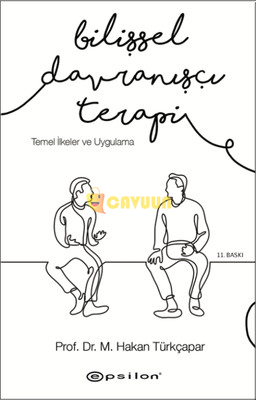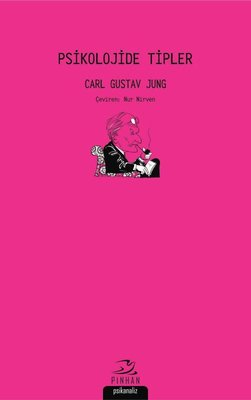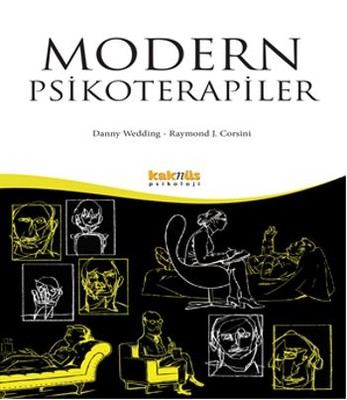Cognitive Behavioral Therapy-Basic Principles and Application
№37353 Created: 15 October 2024
Genre:
Developmental psychology
Binding:
soft
Author:
M. Hakan Turkcapar
Publishing house:
Epsilon Publishing House
The year of publishing:
2018
Cognitive Therapy not only solves current problems of the applicants, but also teaches them a special set of skills that they can use to solve their problems throughout their lives. Remember; "We see things not as they are, but as we are".
“This book, written in the field of cognitive therapy, introduces CBT and conveys the applicable areas of CBT in a fluent and understandable language, which is an advantage for the field of cognitive therapy in Turkey. In addition, I would like to thank Dr. Hakan Türkçapar for providing us with this book, which is a guide for all mental health workers and patients.”
-Dr. Emel Stroup (ABPP, ACT) -
“The new edition of Prof. Hakan Türkçapar's book Cognitive Behavioral Therapy: Basic Principles and Application is a great introduction and overview of the cognitive therapy model. This terrific work provides clinicians with an up-to-date perspective on the cognitive model or psychopathology, how to assess patients, how to work effectively in the first session, conceptualize cases, and diagnose problematic thinking and behavior patterns. This book is an essential resource for clinicians who want to use the cognitive model in a conscious and sophisticated context. I highly recommend it to clinicians.”
-Prof. Dr. Robert L. Leahy
Director of the American Cognitive Therapy Institute Past President of the Association for Cognitive Behavioral Therapies Past President of the International Association for Cognitive Psychotherapy Past President of the Academy of Cognitive Therapy
“Hakan Türkçapar has written a valuable book for Turkish-speaking clinicians interested in the theory and practice of cognitive therapy. Hakan is an experienced CBT clinician who has worked extensively in the field of cognitive behavioral therapy training, supervision, and dissemination in psychiatric institutions in Turkey. I have always enjoyed working with him and I recommend this book to all Turkish-speaking mental health professionals who want to learn the basic principles and practices of cognitive therapy.
-Prof. Dr. Judith S. Beck
Director of the Beck Institute for Cognitive Behavioral Therapy
“Theories are like a camera that takes photographs; the camera lens focuses on a certain point while taking the picture, ignoring the others, and must do so. The wider the angle of the camera, the more elements are covered. Various theories related to human psychology are like this. The difference or privilege of cognitive behavioral therapy at this point is that, among various theories in the field of psychology, it adopts the claim of applying the scientific method to psychology as its starting point and thus differentiates itself from other theories. The fact that cognitive behavioral theory is based on scientific propositions and data (observation, hypothesis-testing of hypothesis) and is based on it, is not exclusive by including other scientific theories, and places the most human-specific aspect of psychology, namely cognitions, at the center and makes them the central support point in change. As we proceed through the pages in a moment and evaluate the theories in terms of the above criteria, it will become clearer why cognitive behavioral therapy is the subject of this book.”
“The aspect that differentiates cognitive behavioral therapy from other psychotherapies in terms of application is that it is a structured treatment. This has two meanings: First, the cognitive behavioral therapy process is structured between sessions. The general structure of the therapy process follows the order of evaluation, initial psychotherapy interview, therapy process, and relapse prevention and strengthening interviews. In other words, the process begins with the determination of evaluation and treatment goals, continues with psychoeducation sessions and a treatment protocol specific to the disorder in which cognitive behavioral interventions are applied, and ends with termination sessions. If necessary, strengthening sessions ar
“This book, written in the field of cognitive therapy, introduces CBT and conveys the applicable areas of CBT in a fluent and understandable language, which is an advantage for the field of cognitive therapy in Turkey. In addition, I would like to thank Dr. Hakan Türkçapar for providing us with this book, which is a guide for all mental health workers and patients.”
-Dr. Emel Stroup (ABPP, ACT) -
“The new edition of Prof. Hakan Türkçapar's book Cognitive Behavioral Therapy: Basic Principles and Application is a great introduction and overview of the cognitive therapy model. This terrific work provides clinicians with an up-to-date perspective on the cognitive model or psychopathology, how to assess patients, how to work effectively in the first session, conceptualize cases, and diagnose problematic thinking and behavior patterns. This book is an essential resource for clinicians who want to use the cognitive model in a conscious and sophisticated context. I highly recommend it to clinicians.”
-Prof. Dr. Robert L. Leahy
Director of the American Cognitive Therapy Institute Past President of the Association for Cognitive Behavioral Therapies Past President of the International Association for Cognitive Psychotherapy Past President of the Academy of Cognitive Therapy
“Hakan Türkçapar has written a valuable book for Turkish-speaking clinicians interested in the theory and practice of cognitive therapy. Hakan is an experienced CBT clinician who has worked extensively in the field of cognitive behavioral therapy training, supervision, and dissemination in psychiatric institutions in Turkey. I have always enjoyed working with him and I recommend this book to all Turkish-speaking mental health professionals who want to learn the basic principles and practices of cognitive therapy.
-Prof. Dr. Judith S. Beck
Director of the Beck Institute for Cognitive Behavioral Therapy
“Theories are like a camera that takes photographs; the camera lens focuses on a certain point while taking the picture, ignoring the others, and must do so. The wider the angle of the camera, the more elements are covered. Various theories related to human psychology are like this. The difference or privilege of cognitive behavioral therapy at this point is that, among various theories in the field of psychology, it adopts the claim of applying the scientific method to psychology as its starting point and thus differentiates itself from other theories. The fact that cognitive behavioral theory is based on scientific propositions and data (observation, hypothesis-testing of hypothesis) and is based on it, is not exclusive by including other scientific theories, and places the most human-specific aspect of psychology, namely cognitions, at the center and makes them the central support point in change. As we proceed through the pages in a moment and evaluate the theories in terms of the above criteria, it will become clearer why cognitive behavioral therapy is the subject of this book.”
“The aspect that differentiates cognitive behavioral therapy from other psychotherapies in terms of application is that it is a structured treatment. This has two meanings: First, the cognitive behavioral therapy process is structured between sessions. The general structure of the therapy process follows the order of evaluation, initial psychotherapy interview, therapy process, and relapse prevention and strengthening interviews. In other words, the process begins with the determination of evaluation and treatment goals, continues with psychoeducation sessions and a treatment protocol specific to the disorder in which cognitive behavioral interventions are applied, and ends with termination sessions. If necessary, strengthening sessions ar
№37353 Created: 15 October 2024







